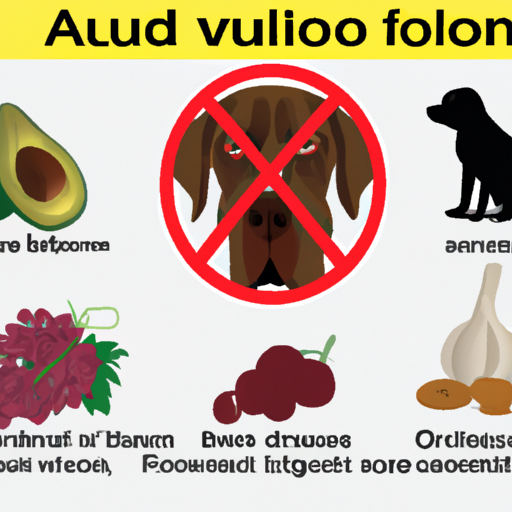As a dog caregiver, your pet’s health is paramount. You strive to provide the best food, love, and care for your furry friend. However, it’s crucial to understand that not all human foods are safe for dogs. Some can cause mild discomfort, while others can lead to serious health issues or even be fatal.
Why Some Food is Bad for Dogs
Dogs have a different metabolic system compared to humans. Certain foods, while wholesome and healthy for us, can cause havoc in a dog’s body. These foods can interfere with the dog’s metabolism, cause digestive problems, or lead to toxic build-up.
Common Foods That Are Harmful to Dogs
Here is a list of some common household foods that you should never feed your dog:
- Chocolate – It contains theobromine, which is toxic to dogs and can cause heart problems, nervous system failure, and death.
- Onions and Garlic – They contain compounds that can damage a dog’s red blood cells and cause anemia.
- Grapes and Raisins – These can cause kidney failure in dogs.
- Avocados – They contain a toxin called persin, which can cause vomiting and diarrhea in dogs.
- Alcohol – It can cause intoxication, nervous system depression, coma, and death.
Effects of Feeding Your Dog Harmful Foods
Feeding your dog with the wrong foods can result in several health problems. These include:
- Digestive problems: This includes vomiting, diarrhea, loss of appetite, and abdominal pain.
- Neurological disorders: These are conditions that affect the dog’s nervous system, such as tremors, seizures, and paralysis.
- Organ damage: This comprises kidney failure, liver damage, and heart problems.
- Death: In severe cases, feeding your dog harmful foods can lead to death.
What to Do If Your Dog Eats Harmful Foods
If you suspect your dog has ingested harmful food, take the following steps:
- Stay calm: Panicking won’t help the situation.
- Remove any remaining harmful food: This can prevent your dog from consuming more.
- Contact your vet immediately: Provide them with as much information as possible about what your dog has eaten.
Preventing Your Dog from Eating Harmful Foods
Prevention is always better than cure. Here are some tips to prevent your dog from eating harmful foods:
- Keep harmful foods out of reach: Ensure foods that are bad for dogs are stored in places your pet cannot access.
- Train your dog not to eat from the table: This reduces the chances of your dog eating harmful foods.
- Educate your family members and guests: Make sure everyone in your household knows what foods are harmful to dogs.
Feeding Your Dog a Balanced Diet
To keep your dog healthy, it’s crucial to provide them with a balanced diet. This includes:
- Protein: This should come from high-quality sources like chicken, beef, fish, or turkey.
- Carbohydrates: These can come from grains, vegetables, and fruits.
- Fats: Healthy fats are essential for your dog’s skin and coat.
- Vitamins and Minerals: These are crucial for your dog’s overall health.
| Food Type | Examples |
|---|---|
| Protein | Chicken, Beef, Fish, Turkey |
| Carbohydrates | Grains, Vegetables, Fruits |
| Fats | Fish Oil, Flaxseed |
| Vitamins & Minerals | Supplements, Certain Vegetables |
FAQ
Q: Why is chocolate bad for dogs?
A: Chocolate contains a compound called theobromine which is toxic to dogs. It can lead to heart problems, nervous system failure, and even death.
Q: Can dogs eat any type of human food?
A: Not all human foods are safe for dogs. Some can be toxic and harmful. Always consult with your vet before introducing new foods to your dog’s diet.
Q: What should I do if my dog eats harmful food?
A: If your dog ingests harmful food, stay calm, remove any remaining food, and contact your vet immediately.
Q: How can I prevent my dog from eating harmful foods?
A: Keep harmful foods out of reach, train your dog not to eat from the table, and educate your family and guests about what foods are harmful to dogs.
In conclusion, as a dog caregiver, it’s your responsibility to ensure your pet stays healthy. Avoid feeding them with harmful foods and provide them with a balanced diet. When in doubt, always consult your vet.



